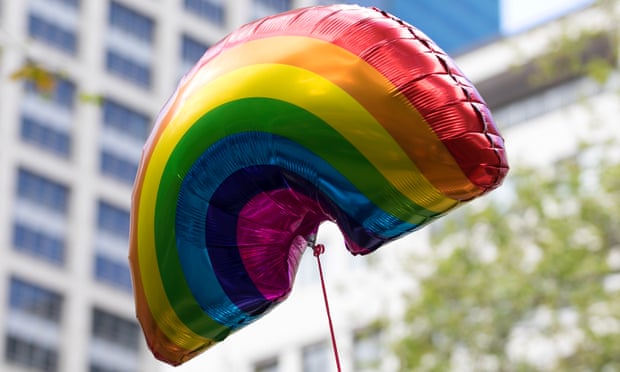
‘This negativity arising from the postal survey will be behind us soon,’ Patrick McGorry said of the marriage equality vote. Photograph: Jonny Weeks for the Guardian
The Nationals senator Matt Canavan’s call for marriage equality advocates to “grow a spine” was “very regrettable” coming from a politician who had faced less adversity than LGBTI Australians, the mental health expert Patrick McGorry has said.
The psychiatrist and former Australian of the year criticised Canavan in an interview on Sky News on Monday, responding to reports that mental health services have experienced a surge in requests for help since the same-sex marriage postal survey was called.
The digital youth service ReachOut said it had seen a 20% increase in people accessing its online advice relating to LGBTIQ issues and half a dozen of the country’s most prominent mental health organisations have held crisis talksto deal with higher demand, according to Fairfax Media.
The National Mental Health Commission has expressed “concerns about the detrimental mental health impacts of the marriage equality debate”.
Last Monday Canavan said people should “stop being delicate little flowers and have a proper debate”. “Can’t we all just grow a spine and grow up?” he said. “The debate hasn’t been that bad.”
McGorry, who is now the executive director of Orygen, the national centre of excellence in youth mental health, said the comments were “very regrettable”.
“I think the people he’s talking about have a very strong spine, actually – they’ve put up with much more adversity than that particular MP is likely to experience in his life and they’ve come through it,” he said. “That doesn’t mean they should be subjected to more of the same.
“He’s entitled to his point of view but I think most Australians wouldn’t agree with that.”
McGorry said the campaign was reviving fears of bullying, persecution and discrimination experienced by LGBTI Australians, particularly at school. “[Those experiences] are coming back to haunt them, in a way, and in a way they hadn’t really expected.”
But McGorry said the yes vote in the Irish referendum on marriage equality had transformed the social landscape and Australia was “on the threshold of something very similar here”.
“[Health minister] Greg Hunt made that point to me last week, and I do agree with that, Australia is about to make a big step forward and this negativity arising from the postal survey will be behind us soon.”
McGorry said clinicians and youth mental health practitioners needed to support people through the what he called an “unnecessary” postal survey process. “We’ve got to suck that up and get on with it, but we do have to look after vulnerable people in the meantime.”
He said a strong yes vote would be positive for achieving an “overdue” social change. “Some people are a bit nostalgic for the 1950s but that’s their view, and I respect that too, but we’ve really got to embrace all Australians.”
Homophobic campaign material in the same-sex marriage postal survey campaignhas included outrageous predictions about the social policy consequences of a yes vote, the elision of homosexuality and child abuse, and religious judgments about sin.
On Wednesday parliament passed a bill requiring campaign communications to be authorised and banning vilification, intimidation and threats against participants in public debate. On the same day Bill Shorten wrote to the prime minister requesting extra resources for LGBTIQ counselling and trauma services.
Labor’s leader in the Senate, Penny Wong, said the bill provided “limited protection” and would not protect against all forms of hate speech already occurring in the debate.
On Monday the shadow assistant treasurer, Andrew Leigh, who has portfolio responsibility for the Australian Bureau of Statistics conducting the survey, said statistics on the increased use of mental health services were “really troubling”.
“It’s not just statistics we’re seeing – we had Eddie, a 14-year-old with two mums, come to parliament last week to talk about the experiences he’s felt as the child of same-sex parents,” he said.
Leigh said children were “feeling the brunt of the nastiness in this campaign”.
[“Source-theguardian”]



